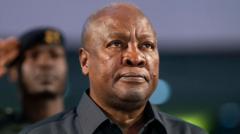Will Ghana Welcome West Africans Deported from the US?

Published: 2025-09-11 08:36:05 | Category: world
Ghana has recently agreed to accept deported individuals from the United States as part of a broader initiative to manage undocumented migration in the region. This agreement, which includes nationals from various West African countries, was announced by President John Mahama, who indicated that 14 individuals had already arrived in Ghana under this policy.
Last updated: 18 October 2023 (BST)
Key Takeaways
- Ghana has accepted deportees from the US under a bilateral agreement.
- 14 individuals, mostly from Nigeria and one from Gambia, have already been deported.
- The agreement aligns with the Ecowas free movement protocol for West African nationals.
- Ghana has facilitated the return of Nigerian deportees to their home country.
- Relations between Ghana and the US are described as both strained and positive.
Background of the Agreement
The agreement between Ghana and the United States is part of a larger strategy aimed at addressing the challenges posed by undocumented migration. President Mahama mentioned that the US approached Ghana to accept third-party nationals being removed from the US, indicating a willingness to assist in the matter. The decision aligns with the Economic Community of West African States (Ecowas) protocol, which allows citizens of member countries to travel and reside in other West African nations without needing a visa.
Details of the Deportation Process
According to President Mahama, the initial batch of deportees includes several Nigerian citizens and one Gambian. Following their arrival, Ghana has already facilitated the return of the Nigerian nationals to their home country by bus. Meanwhile, assistance is being provided for the Gambian deportee to ensure their safe return. The specifics regarding how many deportees Ghana will accept in total remain unclear, as the government has not disclosed a definitive number.
Regional Context and Implications
Ghana's acceptance of deportees comes amid a backdrop of regional cooperation and the complexities of migration in West Africa. The Ecowas free movement protocol aims to enhance regional integration, allowing citizens to move freely across borders for work and residence. This agreement highlights the shared responsibility among West African nations in managing migration flows and addressing the underlying issues that contribute to undocumented migration.
Challenges Faced by Deportees
Deportees often face numerous challenges upon their return, including reintegration into their home countries. Many may have been living in the US for extended periods and could struggle with the transition back to their home environments. Issues such as unemployment, stigma, and lack of support systems can complicate their reintegration process.
US Deportation Policy: Broader Trends
The deportation of individuals to African nations is not a new phenomenon. In recent months, the US has deported individuals to various countries, including Rwanda, Eswatini, and South Sudan. The Trump administration had previously reached out to several African nations to accept deportees as part of its immigration policy aimed at deterring undocumented migration to the US. This approach has faced criticism from human rights groups, who argue that it undermines the rights of those deported.
Reactions from Other Countries
While Ghana has agreed to accept deportees, other countries in Africa have pushed back against similar requests. Nigeria, for example, has been particularly vocal in its opposition, stating that it would not succumb to pressure from the US to accept third-country prisoners. This resistance highlights the varying positions of African nations regarding the handling of deportees and reflects broader concerns about sovereignty and human rights.
Current Relations Between Ghana and the US
Despite the complexities surrounding the deportation agreement, President Mahama described Ghana-US relations as generally positive, albeit under some strain. He pointed to recent developments, such as increased US tariffs on Ghanaian goods and restrictions on visas for Ghanaian nationals, as factors contributing to a "tightening situation." Nevertheless, Mahama remains optimistic about the bilateral relationship.
What Happens Next?
The developments regarding deportations to Ghana raise important questions about the future of migration policies in the region. As Ghana continues to accept deportees, it will be critical to monitor how these individuals are reintegrated into society and the support systems available to them. Furthermore, the response of other West African nations to similar agreements will also shape the landscape of migration management in the region.
In conclusion, Ghana's decision to accept deportees from the US marks a significant step in regional cooperation on migration issues. As the situation evolves, it will be crucial to consider the implications for both the deportees and the broader West African community. How will Ghana and other countries balance the need for humanitarian support with the challenges posed by undocumented migration? #MigrationPolicy #Ghana #USRelations
FAQs
Why is Ghana accepting deportees from the US?
Ghana is accepting deportees as part of a bilateral agreement with the US to address the issue of undocumented migration. This aligns with the Ecowas protocol on free movement among West African nations.
Who are the deportees that have arrived in Ghana?
The first group of 14 deportees includes several Nigerian nationals and one Gambian. They were sent back to Ghana under the new agreement with the US.
How does the Ecowas free movement protocol work?
The Ecowas free movement protocol allows citizens of member states to travel and reside in other West African countries without needing a visa, promoting regional integration and mobility.
What challenges do deportees face upon return?
Deportees often face difficulties such as unemployment, lack of support, and stigma, complicating their reintegration into their home countries.
How have other African nations responded to US deportation requests?
Countries like Nigeria have opposed US requests to accept deportees, emphasizing their sovereignty and the need for humane treatment of individuals being deported.



